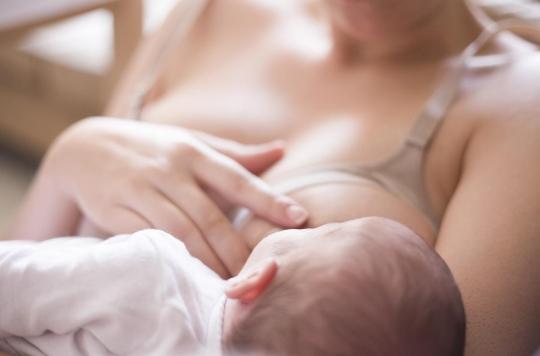A study in breastfeeding women vaccinated with Pfizer or Moderna shows that the vaccine’s messenger RNA was not detected in their breast milk, and therefore was not transferred to the infant.

- 48 hours after being vaccinated with an mRNA vaccine (Pfizer or Moderna), none of the mothers in the study had detectable levels of mRNA from the vaccine in their milk.
- This means that no vaccine compound was transferred to their baby.
Here is a first study that could allay the concerns of women who refused vaccination or interrupted their breastfeeding for fear that the vaccine would alter their milk or be transferred to their baby.
Posted in JAMA Pediatrics, it was conducted by UC San Francisco among seven women who all received a messenger RNA vaccine, Moderna or Pfizer. The results show that the vaccine mRNA was not detected in their breast milk and therefore was not transferred to the infant.
No mRNA vaccine detected in human milk components
The study was conducted from December 2020 to February 2021 among seven mothers whose average age was 37.8 years. Their children were aged from one month to three years. Milk samples were collected before vaccination and at various times up to 48 hours after vaccination. After analysis, the researchers found that none of the samples had detectable levels of vaccine mRNA in any milk component.
“The results reinforce current recommendations that mRNA vaccines are safe during breastfeeding and that people who are breastfeeding and receiving the Covid-19 vaccine should not stop breastfeeding.”says Stephanie L. Gaw, assistant professor of maternal-fetal medicine at UCSF and lead author of the study.
“We did not detect vaccine-associated mRNA in any of the milk samples tested, says Yarden Golan, postdoctoral researcher at UCSF. These results provide experimental evidence regarding the safety of using mRNA vaccines during lactation.”
These results therefore agree World Health Organization recommendations (WHO) to vaccinate breastfeeding people. The Academy of Breastfeeding Medicine meanwhile said there was little risk of nanoparticles or mRNA from the vaccine entering breast tissue or being transferred to milk, which could theoretically affect infant immunity. . Last May, however, a study showed that the baby benefits from maternal immune protection, thanks to the passage of antibodies in breast milk and the placenta.
However, the authors point out that the study is limited by the small sample size. Further clinical data from larger populations are therefore needed to better estimate the effect of vaccines on lactation outcomes.
















